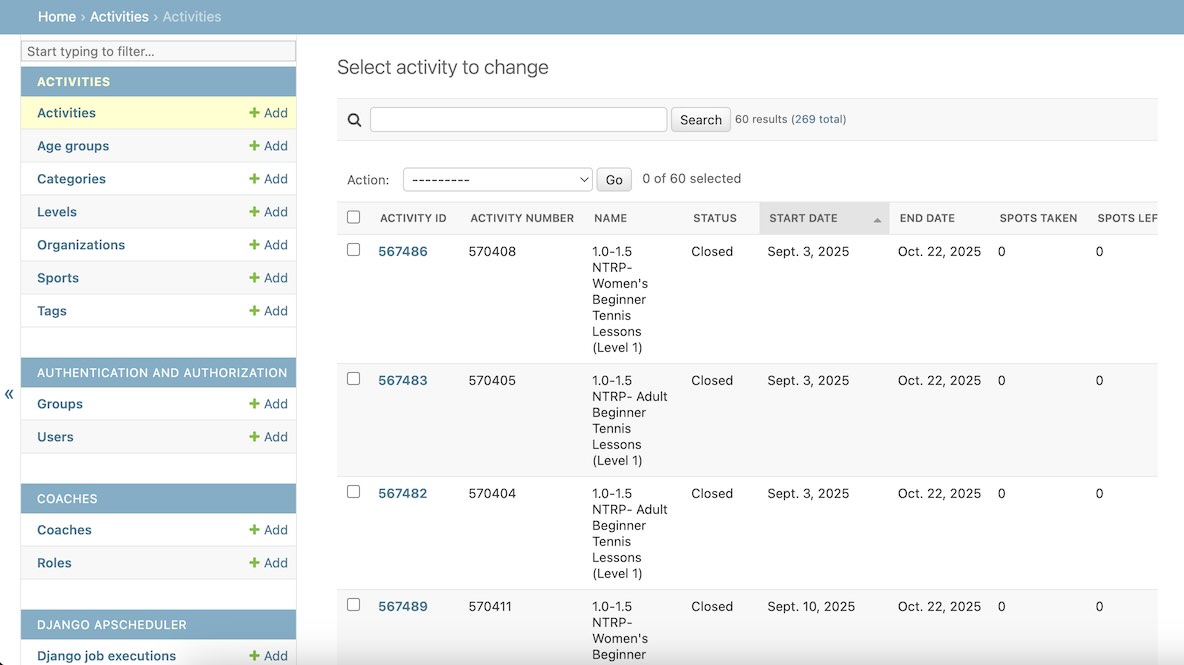Precision Tennis: Dockerized Web Application in Django
Django • Docker • PHP • Github Actions • REST API

Technologies & Skills:
Django, Python, PHP, JavaScript, HTML, CSS, Docker, DockerHub, GitHub Actions, VPS deployment, CI/CD pipelines, system architecture, database modeling, RESTful API design, staging and production environment setup, admin dashboard development, cross-environment orchestration.
Problem
As part of scaling my business, Precision Tennis, I needed to develop a custom administrative dashboard to manage core operations efficiently.
The goal was to centralize workflows that had previously been handled through spreadsheets and manual updates — including adding large volumes of sports classes, managing coach bios, and handling various content updates for the website.
Beyond functionality, I wanted to build a long-term foundation for maintainability and growth: a robust backend, secure authentication, smooth deployment workflow, and clear environment separation for testing and production.
My business partner, who serves as General Manager, also needed an intuitive interface for day-to-day use.
Challenges
The primary challenge was balancing security, performance, and usability while maintaining a system that could evolve as the business expanded.
Additionally, I wanted to establish a CI/CD (Continuous Integration / Continuous Deployment) process to simplify updates — especially since I handle both technical development and business operations.
Implementing containerization through Docker added another layer of complexity, as I aimed to ensure consistent environments between local, staging, and production setups on my VPS.
Another key consideration was the data model architecture.
Since Precision Tennis offers a wide variety of classes, facilities, and coaches, the backend needed to be structured flexibly enough to accommodate future programs (e.g., pickleball, youth camps) without rewriting major parts of the system.
Solution
I built the backend using Django, leveraging its built-in admin panel, ORM, and modular app structure to accelerate development and reduce maintenance overhead.
The framework allowed for quick implementation of features such as class scheduling, coach management, and dynamic content editing — all accessible through a secure administrative interface.
For the frontend, I integrated an existing vanilla PHP, JavaScript, HTML, and CSS stack that powered the public-facing website, ensuring a seamless link between the customer view and the admin operations layer.
To streamline deployment, I containerized the entire application with Docker, separating it into two containers — one for the Django backend and one for the PHP frontend — communicating over a shared network and database.
I then configured GitHub Actions for automated builds and pushes to DockerHub, enabling hands-free deployments directly to my VPS.
I implemented both staging and production environments, with environment-specific variables and shared database management, ensuring stable and predictable rollouts.
This setup allows me to test changes safely before merging them into the live system — a major improvement in reliability and efficiency.
Future Improvements
The administrative dashboard continues to evolve based on internal feedback and business needs.
Ongoing work includes refining usability, enhancing reporting tools, and integrating analytics for better decision-making.
In the long term, I plan to rebuild the frontend using a modern framework such as React or Vue.js, transitioning to a component-based architecture to make development more scalable and accessible for future collaborators.
The project not only transformed how Precision Tennis manages operations but also established a technical foundation that can support long-term business growth with minimal overhead.